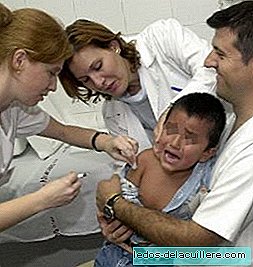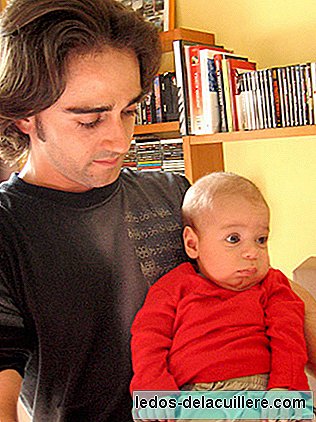
Some time ago we talked about evolutionary stuttering in children. This type of problem in children's speech occurred when they produced some kind of dysfluence (that is, lack of fluency in speech) between two and five years.
But we must bear in mind that although these alterations are frequent in childhood and at the beginning of language, there are also other problems associated with speech fluency that are not so normal and that can be an alarm signal. So, When can we say that our son stutters?.
Next we will see the difference between those difficulties in the child's speech that we can consider normal and those that are not.
Up to five years, as we have already mentioned, in the normal development of language there is often an increase in speech errors, syllables or words can be repeated, hesitation or start a sentence again. Despite this, we could say that our son speaks normal. The reason is that they arise for a short time (for example, one week) and disappear or extend for several months before decreasing.
Therefore, we talk about stuttering when there is a difficulty in speech or when there is difficulty in the smooth and easy flow of words when speaking. Also, when the child repeats or prolongs an unusual number of times the sound or doubts too much time between two words can also be considered as stuttering.
For this, we can establish some alarm signals to be able to differentiate between when the little boy speaks normal and when he does not. Let's see what they are.
Normal dysfluences in the child's speech
They are all those repetitions of words (mom, mom, play with me), hesitation or doubt when speaking (well ... it's raining a lot), interjection (Ummm, ummm, I ... I want a hamburger), crutch (well, it's a dog ... well, an animal ... ) or reformulation of something that is said (I can buy… ? this ... I want a toy) and that they occur without tension or effort by the little one.
They disappear as quickly as they appear, that is, after several days or weeks, and these types of problems occur in situations in which the child is more excited, tired, angry or before words that are long, difficult or new.
Here we can talk about normal dysfluences, since they are associated with the development of language and the elaboration of discourse that with stuttering itself.
Abnormal speech disorders of the child
Apart from the problems of fluency in the child's speech, it is important to check whether or not other manifestations occur that go along with the child's expression or even that of his parents. For example, you can see if the child seems to be affected by his difficulties to speak fluently, even avoiding talking on certain occasions, or if his parents are worried about the way they speak or if there is any type of anxiety.
Some examples of abnormal dysfluences In the child's speech they are:
- Repetitions of sounds or syllables (P ... p ... p ... p ... can i watch TV ?, ju ... ju ... ju ... toy)
- More than two repetitions in short words (but ... but ... but ... but take it)
- Lengthening a sound with a duration of several seconds (qqqqqqqqqqqqqqqq I want that ball)
- Tense silence between words (Why ... the birds fly?)
- Split words (you play with me?)
- Tension while talking or some kind of effort to get the words out
- Movements associated with speech on the face or body, of effort and tension (for example: close your eyes, make faces, move your neck ...)
- Speak very fast
Up to five years, the most frequent mistakes children can produce are repetition of sounds and words, prolongation of syllables, pauses / silences between words and blockages, as well as muscular tension and effort to speak.
Generally stuttering usually appears in the first words of the phrases and also in some specific sounds, being more difficult in certain, such as answering direct questions (for example, what have you done today at school?). However, fluency problems may disappear when the child sings, speaks slowly or whispers.
When this happens, and we realize that our child speaks at some times more fluently than at others when he shows more problems to do so, he usually leaves the parents somewhat disoriented. Therefore, we must always keep in mind that the way and intensity with which the child stutters may vary from one situation to another.
If we see any of these alterations in our child's speech, it is advisable to consult a specialist in order to evaluate them and know if our son stutters before rushing into our conclusions.












